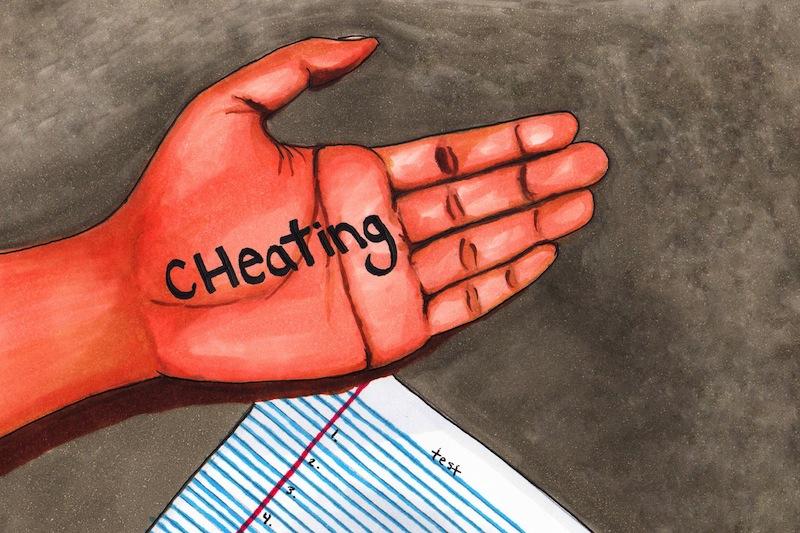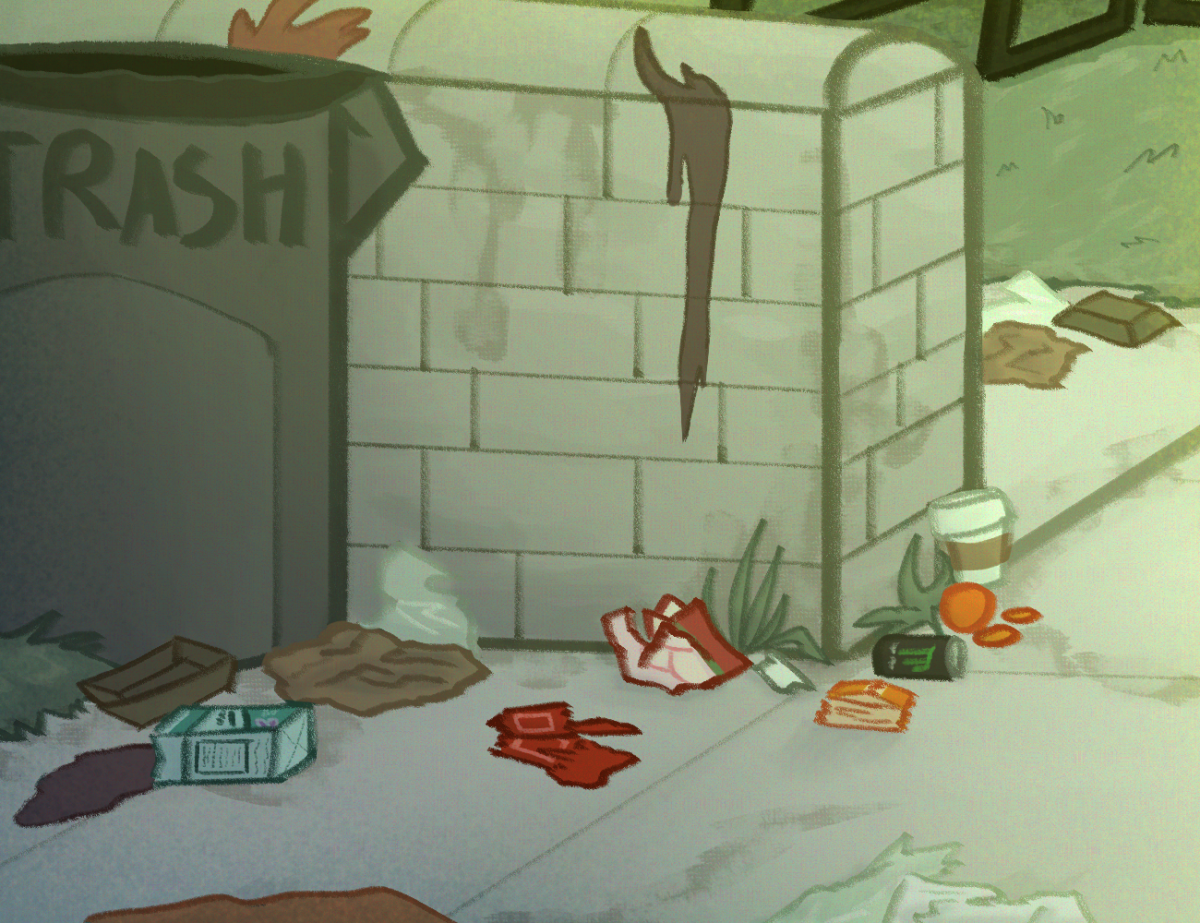
A plague. A plague o’er the education system, a plague o’er the nation, a plague o’er Foothill Technology High School.
During finals week, a localized outbreak of alleged cheating infected Foothill. Surprising? Wait until you hear who the perpetrators were.
AP and honors classes are often seen as strongholds of the intelligent, “good” students, deemed academically superior, destined for success, bound for collegiate rigor and achievement, etc.
For this reason, it is quite shocking at first glance that such “great” students were the culprits of an apparently widespread cheating scandal. This is certainly no minor crime in academia. In fact, cheating at a university generally results in expulsion. At Foothill, it is often cause for a double zero and a “black” mark on that student’s permanent record. Whether such punishment has been decreed in this scenario, I cannot say.
This alleged academic dishonesty broke out in the junior AP US History (APUSH) class.
Now of course news picked off the grapevine is subject to bountiful embellishment or downplay, depending on the gossip’s cause. However, it seems clear that enough juniors in APUSH allegedly cheated on the final exam that the course’s teacher, Mr. Geib, had to throw out the test score.
It appears the outbreak was caused by one or more students circulating the image of a test taken by a prior year’s student. Whether or not every single student in APUSH received such an image —or opened it—is not clear. I have numerous friends who have told me they refused to open it.
Still, the intention of this article is not to guilt those students who succumbed to cheating.
The chance of, say, half the APUSH class being immoral students without a conscience is unlikely, and I wouldn’t doubt if most of these students are clashing with their inner critic right now.
More likely is that the cheating is an indirect effect of the very system which punishes academic dishonesty.
To cheat, or not to cheat? That is the question.
According to Stanford University, “between 75 and 98 percent of college students surveyed each year report having cheated in high school.”
These statistics are staggering, absurd, and downright infuriating.
However, this statistic is much more telling when you look at the number of alumni who reported cheating in 1940: only around 20 percent.
The numbers speak for themselves.
How did it ever get to be like this?
Some may argue that the sole cause for this dramatic spike in recent years is due to the inundation of technology, which makes it increasingly easy for students to cheat on tests and circulate information.
While this is very true and can be clearly seen by any current teacher or student in high school, electronic plagiarism, circulation, and cheating is only one effect of a deeper issue: social pressures and the education system.
It’s no secret that the difficulty, cost and perceived value of getting into a halfway decent university is exceedingly high in the United States.
While a 4.0 GPA used to be a ticket to the college of your dreams, the average person now needs nothing short of a 4.3 GPA to even be considered for universities like UCLA or Stanford.
The great irony of this situation is that Stanford, the school that reported the above statistics, is a prime example of the type of school which indirectly allows cheating in the first place.
Surely Stanford and related schools don’t directly “promote” cheating, but, by turning a blind eye to its omnipresence in high school and making it exceptionally difficult to get into the school, it’s nearly impossible for a student who’s not a savant or remarkable athlete to gain admission.
In addition, less than a 4.3 grade point average is perceived as failure in the eyes of such Ivy League or other prestigious schools. Less than a 4.3 is practically perceived as failure in the eyes of the student, in the eyes of academia, and in the eyes of society.
Fundamentally, most students delude themselves into thinking that their GPA is the one and only indicator of their future success in college, in their career, and in life.
So then, if a GPA foretells the future of a student’s career, what is to stop them from cheating?
Morality? What a naïve concept. Besides, the moral line is blurred. Is it fair that a student exhibiting integrity gets a lower test score than one who cheated?
If success is so synonymous with greatness (which it seems to be, then integrity must be synonymous with weakness).
Gov. Christie’s recent bridge scandal in New Jersey shows us how politicians often exploit their power to get what they want. Bangladesh’s factory collapse in 2013 killing over 1,000 garment workers was easily preventable and forewarned, yet the owner refused to renovate the cheap labor building. Similar accidents continue throughout Bangladesh and other parts of the world. FOX News relies on the exploitation of fearful “news” to maintain viewership.
Yet the encompassing theme here is that all of these incidents are brought about by people who are perceivably successful.
The recent scandal at Foothill involving APUSH students was not a one time thing. Foothill Tech, a school with an exceptionally high emphasis on academic success, is just another brick in the wall of students willing to sacrifice anything for “success.”
In the final analysis, I cannot pretend that cheating is purely vice. As stated before, as soon as one student cheats, that person gains an unfair advantage over the others to the point it almost becomes equal for all the other students to cheat.
Since there will always be a handful of students who cheat, this sticky dynamic will persist.
I understand that most students committing academic dishonesty aren’t aiming to become the spineless governor of New Jersey or an exploitative industrialist in Bangladesh. Most of us are simply trying to get into the college of our dreams, the college with high prestige, the college with that great engineering program, the college that would make our parents proud, etc.
The thing is, if you’re cheating to get good grades in a course that you can’t achieve an A in, fairly, you probably don’t deserve an A in that class. Furthermore, if that helps you get into a “great” university, you probably don’t belong in that university.
Think about it, if you’re cheating so you can enter a school with extraordinarily intelligent peers, you’re likely to find yourself at the bottom of the food chain since you didn’t exactly “earn” your spot, and then what’s to stop you from cheating again?
Cheating becomes a vicious cycle, and ultimately it’s going to catch up with the culprit, as good as their intentions may be.
So, I think we should all, as students, ask ourselves these crucial questions:
Am I really willing to sacrifice my integrity to get into a college where I probably don’t belong in the first place?
If I get into that college, what is to stop me from continuing to cheat?
Will I be more satisfied in a place I feel I should be, or in a place I know I belong?














APUSH ALUMNI 2009-2010 • Feb 13, 2014 at 3:33 pm
My goodness! Although this does not surprise me considering the technology that most students have these days, I am still disappointed that this happened. I think the kids are more damaging themselves more than anything because Mr. Geib specifically designed those tests so that it would help one prepare for the AP test. The amount of energy and study time that my friends and I put into this specific final was intense. We made songs for each fact pattern and memorized them. The second part of the test I don’t want to think about the time i put into studying for it… I don’t think I would have the kind of knowledge that I gained from Foothill if I cheated.
Ms. Pelfrey • Feb 13, 2014 at 9:18 am
“Am I really willing to sacrifice my integrity to get into a college where I probably don’t belong in the first place?
If I get into that college, what is to stop me from continuing to cheat?
Will I be more satisfied in a place I feel I should be, or in a place I know I belong?”
These are excellent questions, Sean. Thank you for writing this thoughtful piece.
Heather Ferris • Feb 12, 2014 at 6:43 pm
Great article, Sean!!! An extremely important issue..,unfortunate to hear about this, but I know there are many students with academic integrity who would never consider cheating. That’s a quality to be celebrated!
2012 Alum • Feb 12, 2014 at 6:10 pm
I graduated a couple years back and heard horror stories of the cheating going on in AP classes, though I was only in a couple of them. I remember sitting at graduation with my friends thinking about how some people cheated their way to a 4.0+ and got away with it unscathed.
APUSH Alum • Feb 12, 2014 at 5:48 pm
This type of cheating is not at all surprising for APUSH. I remember the year I took it the answers to the Short ID section were passed from the first period students to the third and fifth period students almost immediately. Students brought filled out copies of the fact patterns and turned them in. And the same photo (or perhaps a similar photo) of a previous test was passed around.
From my experience in Foothill Advanced Placement and honors courses, there is little academic integrity at Foothill. Few students cheat on everything (but those students exist), but far fewer cheat on nothing. Everyone else falls in the middle.
I agree with the author in that college admission standards heighten the need for cheating — it’s certainly what drove my friends to do it. However, I argue that this would be easily curbed if the administration would actually do something about it.
But the administration cares just as much — if not more — about students’ college admissions as the students do. When more students enter 4-year universities right after graduation, it raises Foothill’s prestige. When students are accepted into “better” universities, it raises Foothill’s prestige.
Students will stop cheating if they know that the threat of being caught is real. Students will stop cheating if they know that the consequences will matter. It’s a risk/reward scenario, and Foothill’s environment rewards cheating.
If teachers/the administration want to stop cheating they need to either crack down or make cheating impossible by actually changing the tests every year.
It also wouldn’t hurt if teachers made curriculum relevant to students’ lives, because you’re far less likely to cheat on something that actually feels important and very little of high school curriculum actually feels important.
Emily Park • Feb 12, 2014 at 5:43 pm
I was ready for this to be an article blaming Foothill for everyone’s cheating transgressions. I was also ready to read something that said cheating isn’t really that wrong since Foothill is a challenging high school and there’s a lot of pressure. I’m glad to say I was wrong. This was a thoughtful piece that balanced a handful of perspectives on all scales of analysis, from the individual student to the educational system as a whole. I thoroughly enjoyed reading it. Great job!